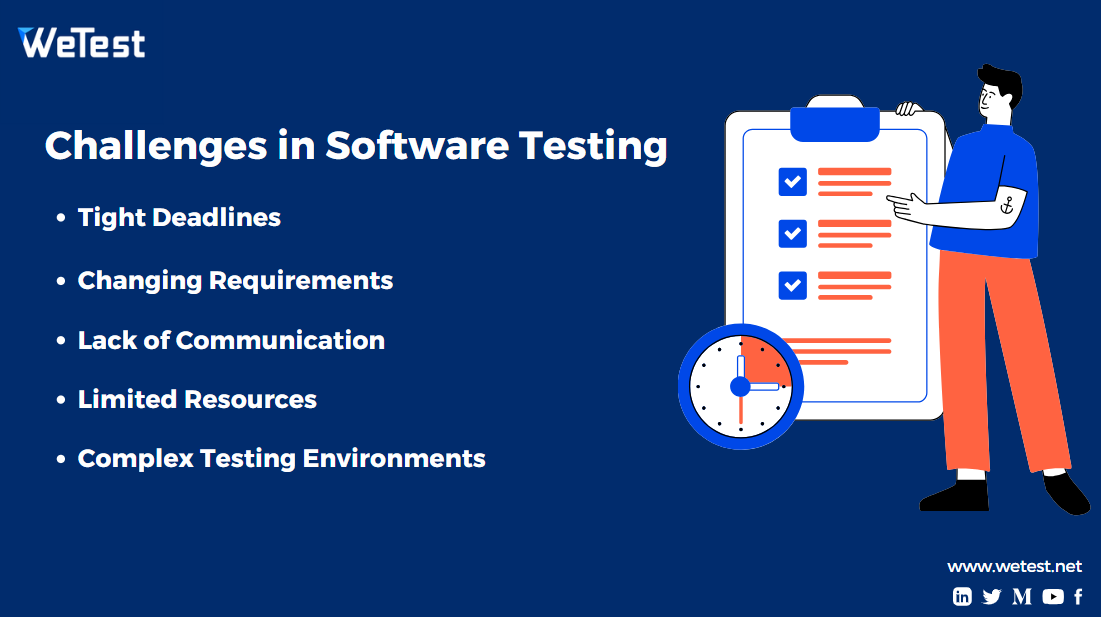Software Testing Challenges and Tips: Ensuring Software Products Quality
Software testing is a crucial aspect of the software development life cycle (SDLC) that helps identify defects, errors, and vulnerabilities in software applications. It plays a vital role in ensuring the delivery of high-quality software products to end-users. However, software testing is not without its challenges. In this article, we will explore the common challenges faced by software testers and provide survival tips to overcome them.
Common Challenges in Software Testing
1. Tight Deadlines
Meeting project deadlines while ensuring comprehensive testing can be a significant challenge. The pressure to release software quickly may compromise the thoroughness of the testing process, leading to inadequate coverage of test cases and potentially overlooking critical defects.
2. Changing Requirements
In agile development environments, requirements are prone to change frequently. Keeping up with evolving requirements and modifying test cases accordingly can be challenging, leading to confusion and potential misalignment between the testing efforts and the desired outcomes.
3. Lack of Communication
Effective communication between development and testing teams is crucial for successful software testing. However, a lack of proper communication can result in misunderstandings, delays, and ineffective collaboration. This challenge is particularly prominent in geographically dispersed teams.
4. Limited Resources
Software testing requires a variety of resources, including skilled testers, testing environments, and test data. However, organizations often face resource constraints, leading to inadequate testing coverage and compromised quality.
5. Complex Testing Environments
Modern software applications operate in complex environments with multiple devices, platforms, and configurations. Testing across these diverse environments can be challenging, and ensuring compatibility and functionality across all scenarios becomes an intricate task.

Survival Tips for Software Testers
1. Collaborate and Communicate
Establish effective communication channels with development teams, product owners, and stakeholders. Regularly participate in meetings, discuss requirements, and provide timely feedback. Encourage open dialogue to ensure everyone is on the same page and potential issues are addressed promptly.
2. Embrace Agile Methodologies
Adopt agile methodologies like Scrum or Kanban to improve flexibility and responsiveness to changing requirements. Agile practices promote iterative testing, continuous feedback, and early defect detection, allowing testers to adapt to evolving project needs effectively.
3. To prioritize Test Cases
When faced with time constraints, prioritize test cases based on risk analysis. Identify critical functionalities, high-risk areas, and user workflows that are essential for the software's core functionality. Focus your testing efforts on these areas to ensure thorough coverage within the given timeframe.
4. Enhance Test Data Management
Establish a robust test data management strategy by creating reusable and representative test datasets. Leverage data generation tools and techniques to generate realistic and diverse test data, covering various scenarios and edge cases. This approach ensures comprehensive test coverage and reduces reliance on production data.
WeTest PerfDog: Enhancing Software Testing Efficiency
WeTest PerfDog is a full mobile platform performance test & analysis tool to improve the performance and quality of applications and games. Recently, WeTest lauched a Special Sale purchase activity, you will be able to get a special offer for purchasing WeTest PerfDog . The special offer includes 300 mins/year for only $19.99, 600 mins/year for only $30.
Client Performance Testing Tool: WeTest PerfDog
1.Performance test& analysis tool for full mobile platform(iOS & Android)
2.All types of applications(games, apps, browsers, mini programs, mini-games, H5, background system processes, etc.)
3.Quickly locating the performance issues without ROOT/Jailbreak
4.Plug-and-play, no need of extra modification on hardware or apps

Welcome to try WeTest PerfDog with Exclusive Purchase Offer.

